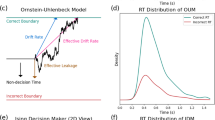Abstract
Three different methods of obtaining ‘certainty equivalent’ valuations of four simple gambles were used with a sample of 358 people paid entirely according to their decisions. The results caution against oversimplistic utility models, and exhibit various characteristics that invite further investigation, including: a marked tendency to round valuations up or down; a tendency to value riskier actions more highly than less risky actions; and multimodal distributions of valuations which, despite their unusual shape, appeared to constitute an identifiable pattern of behaviour.
Similar content being viewed by others
References
Becker, G. M., DeGroot, M. H. and Marschak, J.: 1964, ‘Measuring Utility by a Single-Response Sequential Method’, Behavioral Science 9, 226–32.
Bell, D.: 1982, ‘Regret in Decision Making Under Uncertainty’, Operations Research 30, 961–81.
Butler, D. and Loomes, G.: 1987, ‘Decision Difficulty and the Band of Indifference’, Paper presented to SPUDM-11 Conference, Cambridge, August 1987, mimeo.
Fishburn, P.: 1982, ‘Nontransitive Measurable Utility’, Journal of Mathematical Psychology 26, 31–67.
Friedman, M. and Savage, L.: 1948, ‘The Utility Analysis of Choices Involving Risk’, Journal of Political Economy 56, 279–304.
Kahneman, D. and Tversky, A.: 1979, ‘Prospect Theory: An Analysis of Decision Under Risk’, Econometrica 47, 263–91.
Knetsch, J. L. and Sinden, J. A.: 1984, ‘Willingness to Pay and Compensation Demanded: Experimental Evidence of an Unexpected Disparity in Measures of Value’, Quarterly Journal of Economics 99, 507–21.
Loomes, G. and Sugden, R.: 1982, ‘Regret Theory: An Alternative Theory of Rational Choice Under Uncertainty’, Economic Journal 92, 805–24.
Loomes, G. and Sugden, R.: 1987a, ‘Some Implications of a More General Form of Regret Theory’, Journal of Economic Theory 41, 270–87.
Loomes, G. and Sugden, R.: 1987b, ‘Preference Reversal: Information-Processing Effect or Rational Nontransitive Choice?’, mimeo.
MacCrimmon, K. R. and Smith M. R.: 1986, ‘Imprecise Equivalences: Preference Reversals in Money and Probability’, Working Paper # 1211, University of British Columbia.
MacCrimmon, K. R. and Smith M. R.: 1987, ‘Transaction Reversals: Buying and Selling Lotteries’, Working Paper # 1230, University of British Columbia.
Machina, M. J.: 1983, ‘The Economic Theory of Individual Behavior Toward Risk: Theory, Evidence and New Directions’, Technical Report 433, I.M.S.S.S., Stanford University.
Tversky, A. and Kahneman, D.: 1982, Introduction to Judgement Under Uncertainty: Heuristics and Biases, eds. Kahneman, D., Slovic, P. and Tversky, A., Cambridge University Press, Cambridge.
von Neumann, J. and Morgenstern, O.: 1953, Theory of Games and Economic Behavior (3rd edition). Princeton University Press, Princeton.
Author information
Authors and Affiliations
Rights and permissions
About this article
Cite this article
Loomes, G. Different experimental procedures for obtaining valuations of risky actions: Implications for utility theory. Theor Decis 25, 1–23 (1988). https://doi.org/10.1007/BF00129167
Issue Date:
DOI: https://doi.org/10.1007/BF00129167



